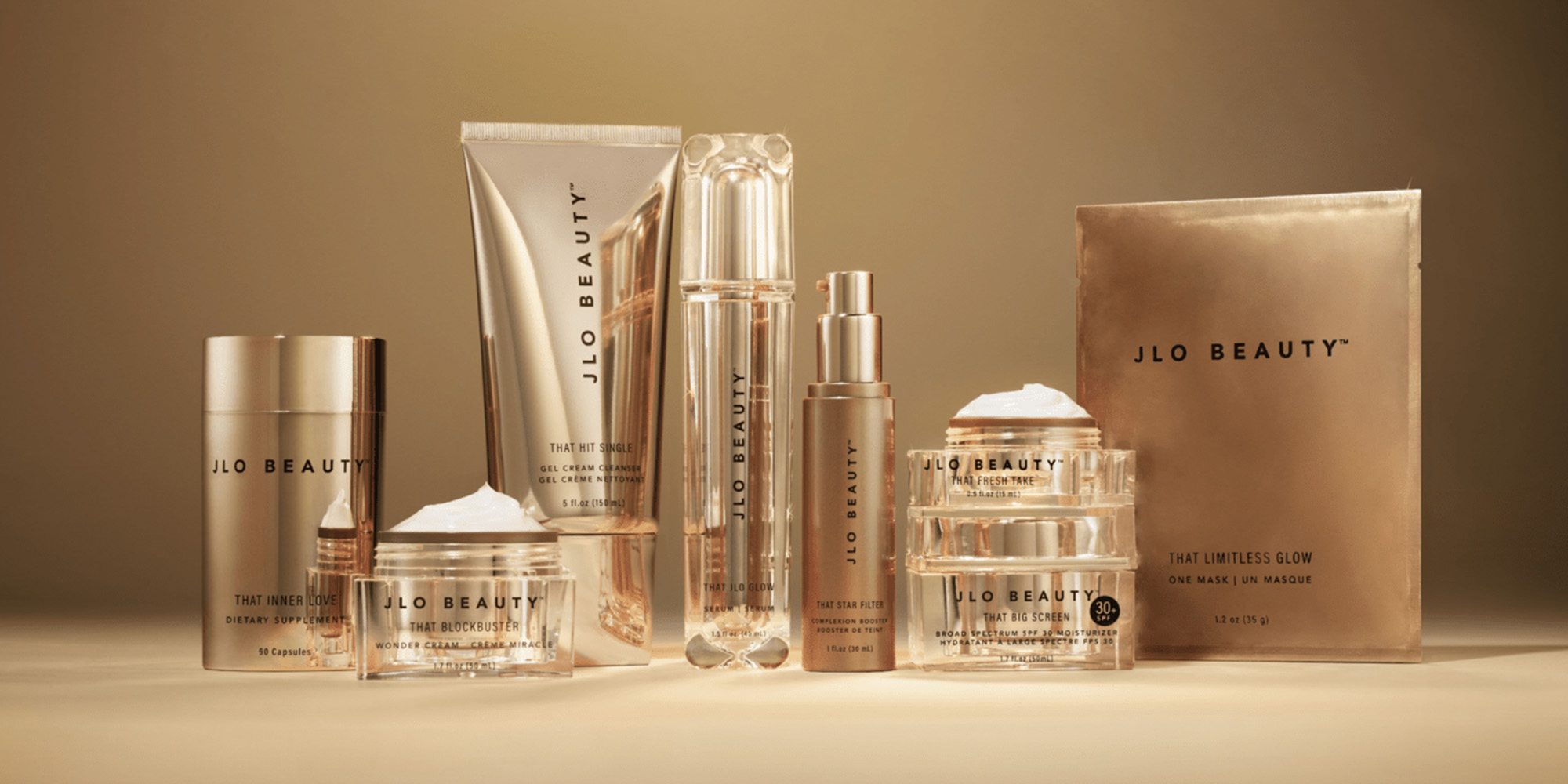
JLo Beauty Exits Sephora’s US Stores
JLo Beauty has exited Sephora doors in the United States, according to store associates.
Calls to the beauty specialty retailer’s locations throughout the New York metropolitan area last week revealed that the skincare and body care brand from Jennifer Lopez, which arrived at Sephora in 2021, was removed from stores, although it remains available on Sephora’s U.S. website and at Sephora stores outside the U.S. In an Instagram comment on Feb. 25, JLo Beauty informed a customer that its products are stocked at Sephora stores in Mexico. The brand also remains available at Macy’s online and in stores chain-wide.
JLo Beauty’s exit from Sephora’s U.S. stores comes after Lisa Sequino departed the CEO post at the brand to become CEO of Supergoop. Representatives for JLo Beauty and Sephora in the U.S. declined to comment on the status of JLo Beauty at Sephora.
The brand was developed by Ascendant Beauty, a joint venture between direct marketer Guthy-Renker and BRX GR LLC, a company registered to Lopez, and secured a brick-and-mortar retail exclusive at Sephora out of the gate. In e-commerce, it went live on Amazon at the time. Sephora introduced JLo Beauty with eight products priced from $18 to $79, including That JLo Glow In A Multitasking Serum, That Limitless Glow In A Multitasking Mask, That Blockbuster In A Nonstop Wonder Cream, That Fresh Take In A Fierce Eye Cream and That Star Filter In An Instant Complexion Booster.
At its Sephora launch, JLo Beauty didn’t specify the number of doors it was rolling out to. However, bolstered by Lopez’s celebrity as a Grammy-nominated singer and actress and her history in the beauty industry—her fragrance franchise with Coty surpassed $2 billion in sales—sales expectations for the brand were high. Industry sources cited by the publication Women’s Wear Daily forecast that JLo Beauty could reach around $150 million in 2021 North American retail sales.
JLo Beauty made its debut at a moment rife with celebrity beauty brand launches, giving it plenty of competition for beauty shoppers interested in products linked to famous names. Over 40 celebrity-fronted beauty brands bowed between 2020 and 2023 from figures as varied as Brad Pitt and Sofia Vergara. Beyonce’s Cécred is the latest celebrity beauty brand.

Following the rush of entrants, the growth of new celebrity beauty brands has trailed off recently. Market research firm NielsenIQ estimates that there were 19 celebrity beauty brand launches in 2021 and six in 2023 as of November last year. Celebrity beauty brand sales increased 57.8% from $691.5 billion in 2022 to nearly $1.1 billion in 2023.
Star power certainly doesn’t guarantee that a brand will skyrocket at beauty stores. A thread in Reddit’s Sephora subreddit group posted five months ago showed a photo of JLo Beauty products at Sephora with the header, “JLO beauty ~literally~ collecting dust.” A user with the handle creolegold wrote, “Lmao embarrassing. I don’t trust J. Lo Beauty because I don’t think she actually uses it. I would not trust Beyoncé beauty because I don’t think she actually uses it. The reason we wear FB [Fenty Beauty] and FS [Fenty Skin] is because Rihanna actually uses it and it’s something we can tell she’s genuinely interested in. This is a cash grab to me.”
While 54-year-old Lopez hasn’t faded from the headlines—she married Ben Affleck in 2022 and is currently promoting two Amazon films, musical “This Is Me… Now: A Love Story” and documentary “Greatest Love Story Never Told,” along with the album, “This Is Me… Now”—Rachel Roberts Mattox, a beauty brand developer and market strategist, theorizes the positioning of her brand and its target demographic clashed with Sephora’s focus on younger consumers. Investment bank Piper Jaffray’s survey of gen Z consumers last year showed Sephora is their No. 1 preferred beauty destination, a distinction previously held by Ulta.
The Greatest Love Story Never Told
“The evolving Sephora demographic leans towards younger consumers who tend to be brand agnostic. Their buying behavior is driven more by a brand’s virality on TikTok, efficacy, affordability, branding and playful packaging,” she says. “JLo Beauty seems to be targeting a slightly older consumer with product strategy, branding and messaging that feels outdated in today’s landscape…If you look at other successful celebrity brands like Rhode or Rare Beauty, they have tapped into the cultural zeitgeist in a way that JLo Beauty hasn’t with cult-worthy, viral products that are safe, fun and feed-worthy.”
Brands connected to recognizable personalities have a mixed track record at Sephora. Influencer brands particularly have been hit or miss. Summer Fridays, the brand started by Marianna Hewitt and Lauren Ireland, Refy by Jess Hunt and One/Size by Patrick Starrr are hits. Selfless by Hyram, originally a partnership between Hyram Yarbro and The Inkey List, and Item Beauty, a brand affiliated with Addison Rae birthed at Ipsy parent company Beauty For All Industries’ former incubator Madeby Collective, were misses at Sephora. Subsequent to Sephora, Selfless by Hyram landed at Target, and Yarbro split from The Inkey List. Item Beauty is defunct.
“It isn’t lost on the consumer that JLo’s youthful glow comes from the best dermatologists, doctors, trainers and wellness gurus in the world and not her skincare line.”
Celebrity brands have been comparably strong performers for Sephora. In 2021, the magazine Forbes estimated that the bulk of Rihanna’s fortune, estimated to be $1.4 billion, was due to Fenty Beauty, a partnership between the singer and Kendo Brands, the incubator owned by Sephora parent company LVMH Moët Hennessy Louis Vuitton. Fenty Beauty launched in 2017 at Sephora and later expanded to Ulta, Ulta Beauty at Target’s assortment, Harvey Nichols and Boots.
Selena Gomez’s Rare Beauty premiered at Sephora mere months before JLo Beauty, and sources told the magazine Fast Company last year that it expected to exceed $300 million in 2023 sales, triple the amount it generated the prior year. This year, Sephora has onboarded a slew of buzzy brands, many of which initially gained traction in social media and direct-to-consumer distribution. Among them are Hello Sunday, Dieux Skin, Soft Services, Salt & Stone and Iris & Romeo.
Rebecca Bartlett, founder and creative director of brand strategy agency Bartlett Brands, suggests that JLo Beauty’s stumbles at Sephora stem from Lopez’s lack of credibility in the results-based skincare realm. Efficacy is paramount for the brand’s core consumer base of women over 40 years old.
“We’ve done a lot of research on this segment’s mindset around skincare and consistently see that by 40, the interest in an inspiring brand is replaced by what we call ‘make it burn,’ which is essentially the perception of guaranteed results over anything else, including brand,” says Bartlett. “It isn’t lost on the consumer that JLo’s youthful glow comes from the best dermatologists, doctors, trainers and wellness gurus in the world and not her skincare line.”
She emphasizes celebrity beauty brand founders must be seen as authorities in categories where efficacy is prized above playfulness or emotion to build healthy businesses in them. Bartlett says, “Otherwise they are best suited for heart-led or lifestyle categories where performance is still important, but not the only determining factor.”

Early on, Lopez’s lack of transparency about her beauty maintenance was roundly criticized. In social media videos for JLo Beauty, she attributed her complexion to incorporating olive oil in her skincare routine, a beauty secret she explained was passed down in her family. Fans didn’t buy it, and many claimed the star was getting Botox and fillers to produce her signature glow. She emphatically denied using Botox.
Olive oil features prominently in JLo Beauty’s product assortment that now spans 13 individual skincare and body care products plus sets. The brand’s formulas contain what it calls the JLo Beauty olive complex, a blend of squalane, fermented oil, extra virgin oil and leaf extract.
At Guthy-Renker, JLo Beauty sits within a brand stable that houses fellow celebrity beauty properties Cindy Crawford’s Meaningful Beauty and Ellen DeGeneres’s Kind Science. Crépe Erase and Westmore Beauty are non-celebrity members of Guthy-Renker’s beauty brand stable. Meaningful Beauty has grossed more than $2 billion worldwide since its 2004 launch, per the company’s site.
For celebrity beauty brands to thrive in today’s market, Mattox believes they can’t rely on the influence of a single person. “The new playbook requires that the celebrity pivot from spokesperson to visionary founder. The brand should embody the founder’s vision, but it should look, sound and feel like it’s about their fans, not them. The brand must meet its customers where they’re at, online and IRL,” she says. “For better or worse, I don’t see the industry ever reaching peak celebrity.”





Leave a Reply
You must be logged in to post a comment.